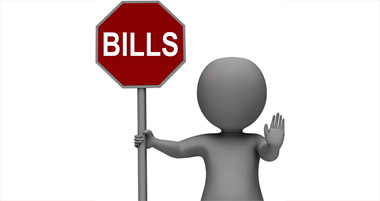Debts
Bankruptcy Law
What Debts Can I Eliminate Through Bankruptcy?
ELIMINATING YOUR DEBT and obtaining a financial fresh start are the primary goals of filing for bankruptcy protection. Understanding what debts can be discharged in bankruptcy is critical, to ensure that you are able to obtain the financial fresh start that you desire.
There are a vast array of debts which can be eliminated through bankruptcy and only a few which cannot. Some of the debts that can be discharged include:
- Credit cards
- Medical bills
- Utility bills
- Old evictions
- Payday loans
- Foreclosures
- Repossessions
- Personal injury cases
- Judgment fees against your license
- BMV Reinstatement fees
- And more!
The Bankruptcy Automatic Stay

ALL COLLECTION ACTIVITY MUST STOP regarding all of your debts immediately upon filing your bankruptcy case with the court. This automatic protection initially goes into effect against every debt, regardless of whether or not the debt can or cannot be eliminated in bankruptcy. Creditors can no longer call, write, continue with court cases, and cannot continue to garnish wages or bank accounts. ALL collection activity must stop as soon as your bankruptcy case is filed.
The Bankruptcy Permanent Injunction
ALL DEBTS THAT CAN BE ELIMINATED through the bankruptcy are forbidden from every type of collection on the debts once the bankruptcy court issues your bankruptcy discharge. Legally, creditors are permanently enjoined from collection efforts. This means that the creditor cannot call you, cannot write you, cannot sue you, cannot garnish you, and cannot report that you owe the discharged balance on your credit reports. The permanent injunction provides you with the financial fresh start that you desire.
- Bankruptcy overview
- Chapter 7
- Chapter 13
- Income
- Non-Dischargable
- Student Loan
- Wait to File
- Debts
- Credit Repair
- Home Ownership
- Lawsuit Protection
- Wage Garnishment
- Tax Relief
- Vehicles
- Bankruptcy and Payday Loans in Ohio
- Bankruptcy Discharge Reinstatement Fees
- Bankruptcy Trustee
- Best Bankruptcy Attorney
- Why Use Bankruptcy Lawyer
- Avoiding Mortgages and Judicial Liens Through Bankruptcy in Ohio
